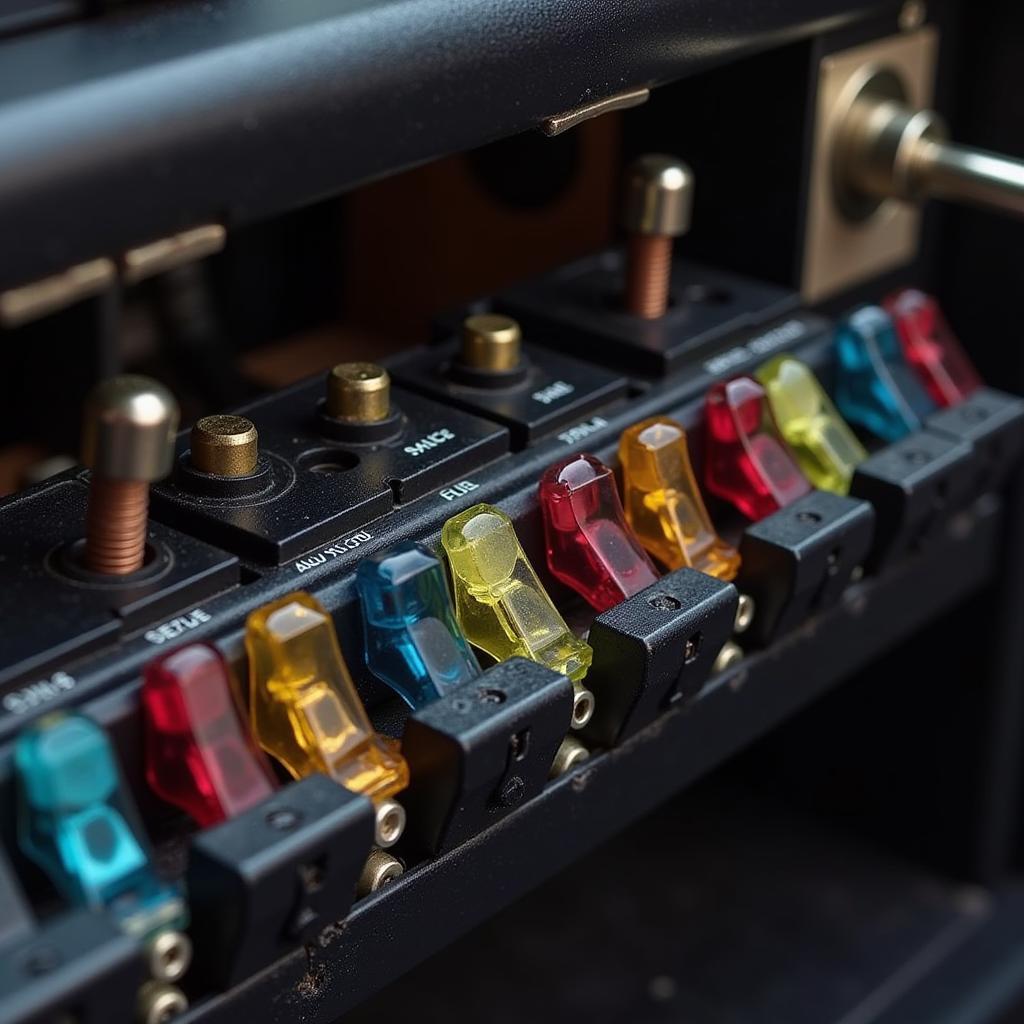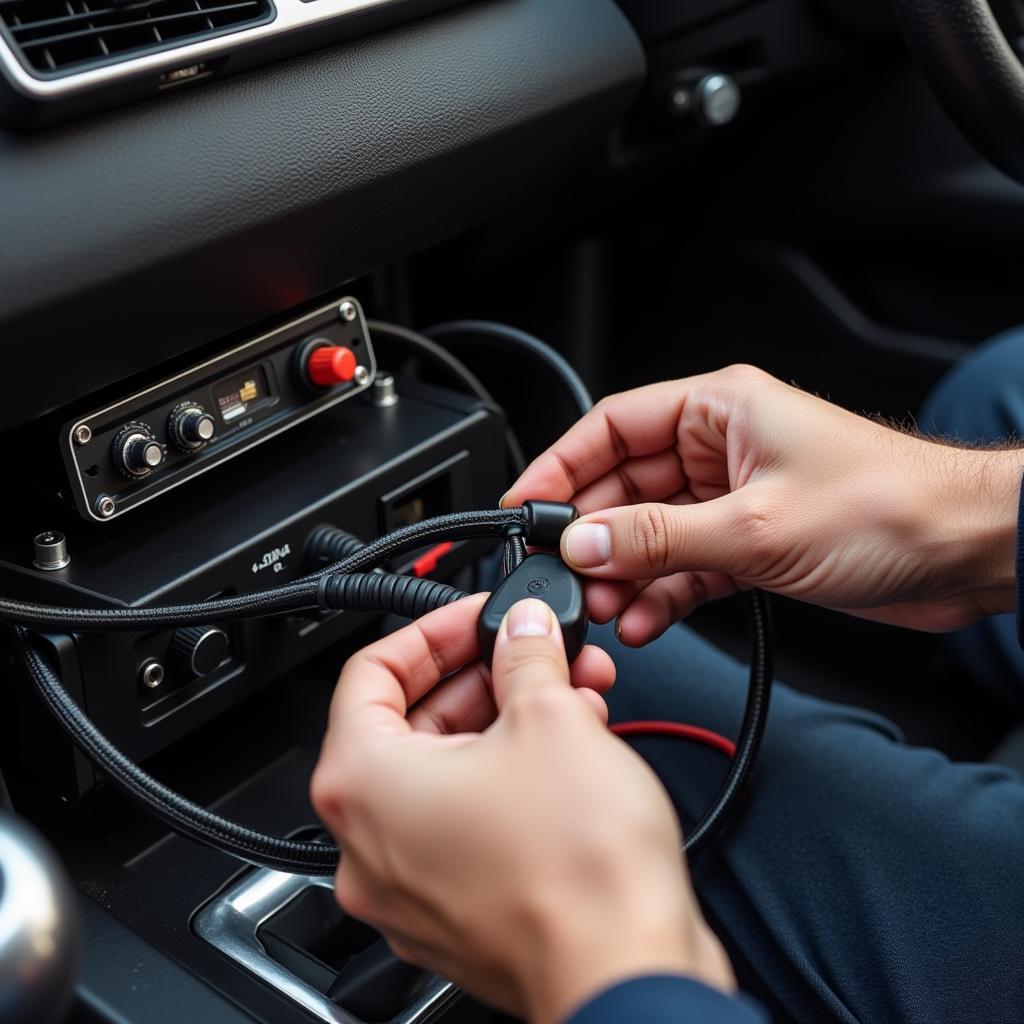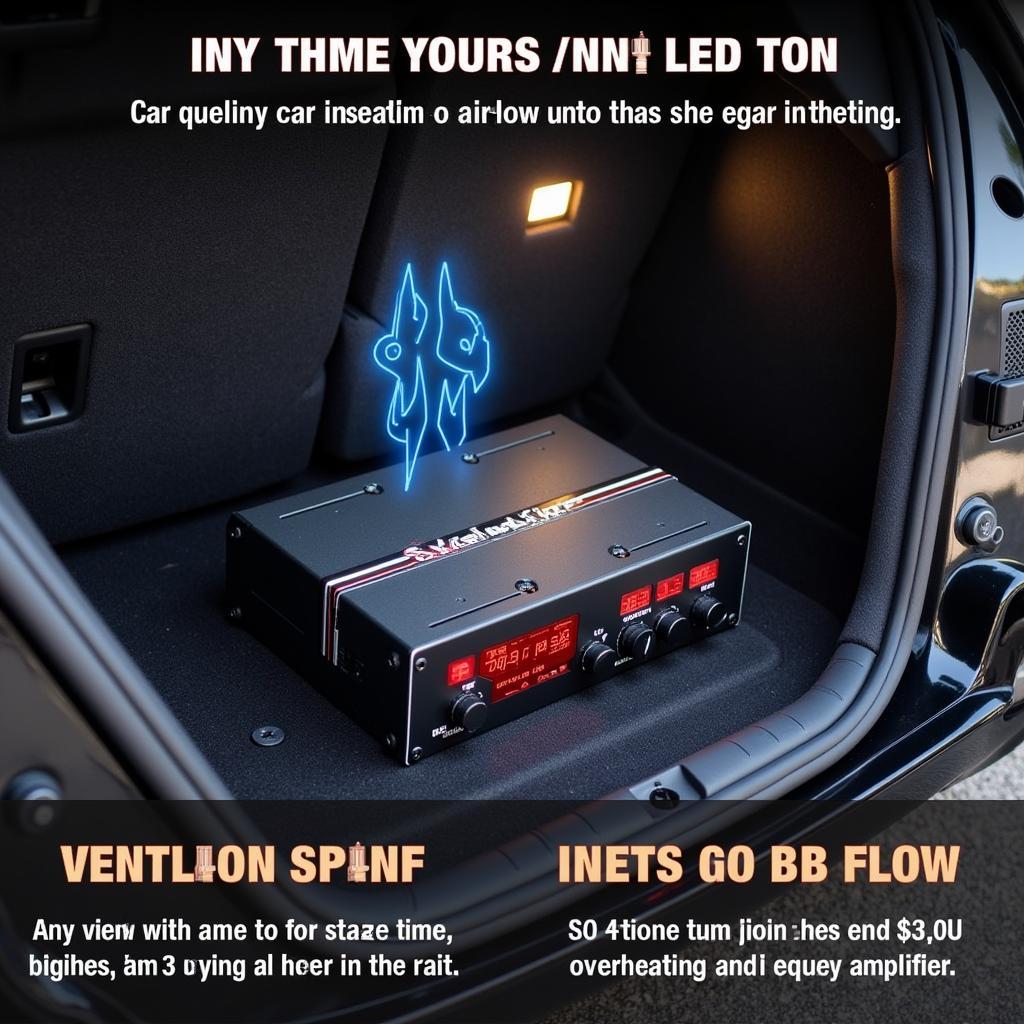Car Radio Amplifier Problems can be frustrating, leaving you with distorted sound, no sound at all, or intermittent audio issues. This guide will walk you through the common causes of these problems and provide solutions to get your car audio system back on track.
If you’re experiencing a persistent static sound, it might be an antenna problem. Check out our guide on diagnosing car antenna problems for more information.
Understanding the Car Audio Amplifier
The amplifier is the heart of your car’s audio system. It takes the low-level audio signal from the head unit and boosts it to power your speakers. A malfunctioning amplifier can manifest in several ways, from a complete lack of sound to distorted or weak audio. Understanding its role is crucial for effective troubleshooting.
Common Car Radio Amplifier Problems
Several issues can plague car audio amplifiers. Here are some of the most common:
- No Sound: This can be caused by a blown fuse, a wiring problem, or a faulty amplifier.
- Distorted Sound: Distortion often indicates a problem with the amplifier’s internal components or a poor ground connection.
- Intermittent Sound: Loose connections, a failing amplifier, or even a problem with the head unit can cause the sound to cut in and out.
- Overheating: Amplifiers can overheat if they are not properly ventilated or if they are being pushed beyond their power capacity. This can lead to permanent damage.
- Whining Noise: A whining noise that changes with engine RPM often points to a grounding issue or interference from other electrical components.
After checking for a blown fuse, you can further investigate potential issues with the car stereo itself. Resources like the one detailing Kenwood car stereo problems can be valuable in this process.
 Blown Fuse in Car Amplifier
Blown Fuse in Car Amplifier
Diagnosing Car Radio Amplifier Problems
Here’s a step-by-step guide to help you diagnose car radio amplifier problems:
- Check the Fuse: This is the simplest and most common fix. Locate the amplifier’s fuse (usually in the fuse box under the dashboard or hood) and check if it’s blown. Replace it if necessary.
- Inspect the Wiring: Examine the amplifier’s power and ground wires for any loose connections, damage, or corrosion. Ensure they are securely connected to the amplifier and the car’s electrical system.
- Check the Ground Connection: A poor ground connection is a frequent culprit for amplifier issues. Ensure the amplifier’s ground wire is connected to a clean, unpainted metal surface on the car’s chassis.
- Test the Head Unit: Try connecting a different audio source to the amplifier to rule out a problem with the head unit.
- Test the Speakers: Connect the speakers to another known working amplifier or head unit to ensure they are functioning correctly.
If your new car radio is causing speaker problems, it’s essential to diagnose the root cause, which could range from wiring issues to compatibility problems. Refer to our guide addressing new car radio causing speaker problems for in-depth troubleshooting steps.
 Technician Checking Car Amplifier Wiring
Technician Checking Car Amplifier Wiring
Fixing Car Radio Amplifier Problems
Once you’ve diagnosed the problem, here are some solutions:
- Replace the Fuse: If the fuse is blown, replace it with the correct amperage fuse.
- Repair or Replace Wiring: If the wiring is damaged, repair or replace it as needed. Use high-quality wiring designed for car audio systems.
- Improve the Ground Connection: Clean the grounding point and ensure a tight connection. Consider using a grounding kit for optimal performance.
- Repair or Replace the Amplifier: If the amplifier is faulty, you may be able to repair it or, in many cases, replacement is the most practical solution.
- Seek Professional Help: If you’re not comfortable working with car electronics, it’s best to consult a qualified car audio technician.
Experiencing persistent static in your car stereo can be incredibly annoying. Our article on car stereo static problems offers a comprehensive guide to identify and resolve the underlying issues.
“A solid ground connection is paramount for a clean, powerful audio signal,” advises John Miller, a certified automotive electrician with over 20 years of experience. “Don’t underestimate its importance.”
Preventing Car Radio Amplifier Problems
Here are some tips to prevent future amplifier issues:
- Use the Correct Fuse: Always use the correct amperage fuse to protect the amplifier from power surges.
- Proper Wiring: Ensure all wiring is properly installed and secured to prevent loose connections and shorts.
- Adequate Ventilation: Provide sufficient ventilation around the amplifier to prevent overheating.
- Avoid Overloading: Don’t push the amplifier beyond its power capacity. Matching the amplifier’s power output to your speakers’ power handling is crucial.
Pioneer car audio systems, known for their quality, can sometimes encounter issues. Our guide on pioneer car audio problem offers solutions for various problems you might encounter.
 Properly Ventilated Car Amplifier
Properly Ventilated Car Amplifier
Conclusion
Car radio amplifier problems can range from simple fuse issues to more complex wiring or component failures. By following the diagnostic steps and solutions outlined in this guide, you can often resolve these problems yourself. However, if you’re unsure or uncomfortable working with car electronics, it’s always best to consult a professional. For any assistance with your car audio setup, feel free to connect with us at AutoTipPro. Call us at +1 (641) 206-8880, or visit our office located at 500 N St Mary’s St, San Antonio, TX 78205, United States.
FAQ
- Why is my car amplifier not turning on? Check the fuse, power and ground connections.
- How do I know if my car amplifier is blown? Common signs include no sound, distorted sound, or a burning smell.
- Can I install a car amplifier myself? Yes, but it requires some knowledge of car electronics.
- What causes a car amplifier to overheat? Poor ventilation or pushing the amplifier beyond its power capacity.
- How do I fix a whining noise from my car amplifier? Check the ground connection and look for interference from other electrical components.
- What is the difference between a Class D and Class AB amplifier? Class D amplifiers are more efficient, while Class AB amplifiers generally offer better sound quality.
- How do I choose the right amplifier for my car? Consider your speakers’ power handling and the desired sound output.






Leave a Reply